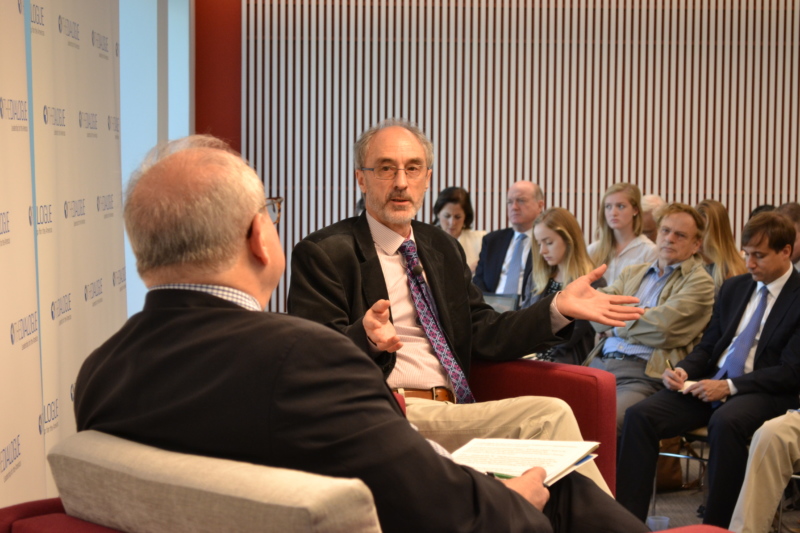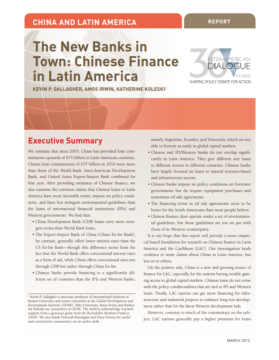Hugo Stay Home
Hugo Chavez, the Venezuelan president, has clearly been enticed by the Libyan drama, where his longtime friend and ally, Muammar al-Qaddafi, is under siege from rebel forces.
On July 25th, the Inter-American Dialogue invited Phil Gunson, Senior Analyst at the International Crisis Group (ICG) and long-time reporter on Venezuela, to discuss the upcoming constituent assembly and its effects on the political crisis consuming Venezuela. Michael Shifter, President of the Dialogue, moderated the discussion. The event focused on analyzing key actors and possible future scenarios around the political crisis, Leopoldo López’s house arrest, and the response of the international community, including the Trump administration.
When discussing Venezuela, the country has hit 'rock bottom,' 'the precipice,' 'a critical juncture' many times. The question concerning many is if the constituent assembly is the real turning point? For Phil Gunson, the Constitution of 1999 and the elections under Hugo Chávez guaranteed that Venezuela was operating under a democratic framework. Throughout the years, and particularly now, the government has eroded democratic institutions, and, for many Venezuelans, they are hollow. For some in Maduro’s government, the constituent assembly seems to be a bargaining chip to negotiate with the opposition. For others, the assembly is a serious commitment to implement the next phase of the Bolivarian Revolution. The constituent assembly is therefore a serious juncture for the Venezuelan people and Maduro’s government.
On the other side, the opposition is committed to a non-violent struggle. Despite past mistakes and internal divisions, the coalition of parties under the Democratic Unity Table (MUD) has won electoral strength, garnered international support, and called their followers to peaceful protests. According to Phil Gunson, this strategy might not work in the face of a regime that seeks to coerce people through violence and intimidation, but the opposition is doing it right.
Is @realDonaldTrump's policy towards Venezuela "subtle"? Not so much, says @philgunson #VZinChaos
— The Dialogue (@The_Dialogue) July 25, 2017
Watch live ▶️: https://t.co/28vWvmcxnh pic.twitter.com/x1DcwEi4tZ
When asked to sketch out possible paths out of the Venezuelan crisis, Phil Gunson responded with caution. One possible path is the Zimbabwe scenario: the regime consolidates its power through violence against a poverty-ridden people. Venezuela’s financial collapse and the possibility of a default are very likely scenarios and only a matter of time. The other possible and dangerous path is a civil war: discontent among the army results in a split within the armed forces and the taking up of arms.
For Gunson, the desirable solution is a negotiated one. Dialogue has a bad reputation in Venezuela since the Vatican and former President Zapatero began talks with the government in October. A better word is “negotiation.” The government and the opposition must negotiate and strive towards a re-democratization process and a national unity government that restore the 1999 constitution. However, negotiations might be difficult under Maduro’s divided government, especially under the influence of Diosdado Cabello, the hardline former president of the National Assembly.
Gunson was not quick to celebrate the transfer of opposition leader Leopoldo López into house arrest. In his perspective, the motives behind this government action are either to relieve some international pressure and begin negotiations or to divide the opposition and buy itself some time. López’s house arrest coincided with the G20 Summit, so there might be plans behind the scenes explaining his transfer.
"Maduro has shouted for years about an economic war against VZ which hasn't existed, but it might after July 30." @philgunson #VZinChaos
— The Dialogue (@The_Dialogue) July 25, 2017
The unconstitutional assembly and the state violence against the wave of protests have caught the attention of the international community. For Gunson, the Venezuela crisis has transformed into an international debate. In fact, most countries are "debating Venezuela without Venezuela." Countries, especially neighboring countries, are concerned about the refugee flows, the health epidemics, and the organized crime that will spill over—or already has—across their borders. The role of Cuba is an important one, because both countries rely on each other. Maduro listens to Raúl Castro and Cuba’s economic survival depends on Venezuela’s petro-diplomacy. The more concerning actions are those of the United States under the Trump administration. According to Gunson, punishing the Venezuelan government will not solve the issue. It will only help Maduro’s narrative of an economic war and increase the costs to an exit strategy. The US should focus on recognizing the national assembly and its legitimacy, considering targeted sanctions, and aiding the Venezuelan people.
The event concluded with a question and answer section on the role of the United Nations in mediating the crisis, the declining popular support for Maduro’s government, the connection between government figures and narcotrafficking, the question of the armed forces, and the internal divisions within the opposition.
Hugo Chavez, the Venezuelan president, has clearly been enticed by the Libyan drama, where his longtime friend and ally, Muammar al-Qaddafi, is under siege from rebel forces.
Estimates of the volume, composition, and characteristics of Chinese lending to the region since 2005.
Is the Venezuelan government likely to comply with the IACHR’s ruling or will it uphold the ban?
 Ben Raderstorf / Inter-American Dialogue
Ben Raderstorf / Inter-American Dialogue
